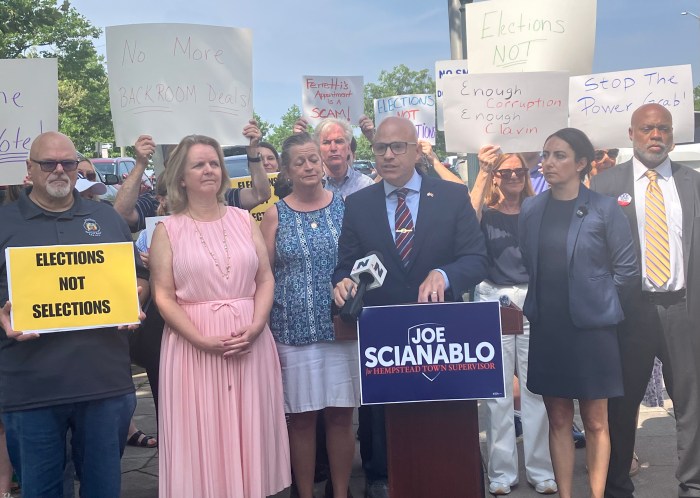Village of Ocean Beach employees violated village-issued credit card policies 92% of the time on nearly 3,000 transactions totaling $356,610 over a four-year span, a New York State audit revealed.
Village officials acknowledged the lapse but maintained that no evidence was found that employees used the cards to pay for personal expenses, despite questions raised from auditors. The 17-page report is the long-awaited second installment of a financial review by state Comptroller Thomas DiNapoli’s office – the first of which resulted in the resignation of the former village clerk-treasurer earlier last autumn.
“The board did not ensure that village employees appropriately used village credit cards,” the audit stated. “As a result, employees made questionable purchases on the village’s credit cards … Without oversight and itemized receipts, the board could not determine whether purchased items were appropriate and for village purposes.”
The state comptroller’s office routinely audits the hundreds of government agencies statewide to ensure that state and local government entities use taxpayer money effectively and efficiently. The last time the state comptroller’s office audited the village was in 1995, when then-Mayor Michael Youchcah’s administration was found to have not properly advertised some bids, not properly verified expenses and had fund balance concerns, among other issues.
The latest audit focused on use of the village’s five bank credit cards, two of which are specifically for fuel purchases and one for a home improvement store. One of the gas cards has 19 authorized users and the other has three while one of the general credit card accounts has three authorized users and the other has two. The home improvement store card has two authorized users. The audit period spanned June 1, 2018, to February 28, 2021.
The audit found that $317,517 worth of transactions did not have a signed receipt or credit card slip and $39,093 worth did not have any receipts included with the claims. Purchases reviewed include $134,742 from 549 home improvement store transactions, $85,506 for 1,741 fuel purchases, $25,140 for 180 online retailer transactions, $23,242 for 32 furniture and appliance transactions, $16,687 for 65 wholesale warehouse club and grocery store transactions, $11,595 for 87 television service subscriptions transactions, $8,571 for 134 restaurant transactions and $66,343 for 320 other miscellaneous transactions.
“The board did not thoroughly review claims before approving them for payment or ensure that employees complied with the village’s credit card policy,” the audit stated.
“Our village credit card policy may have not been complied with in every instance,” Ocean Beach Village Mayor James Mallot wrote in response to the audit. “The village will make its best efforts in the future to ensure compliance with our policy.”
The audit raised questions about several specific transactions. For instance, in the fuel purchases, receipts did not always identify the vehicle being fueled, several employees did not appear to enter valid odometer readings and none contained a vehicle description or license plate number, the audit stated.
“Because the board did not implement adequate internal controls over the use of village credit cards for fuel purchases, it has limited assurance that fuel purchases were reasonable and appropriate and that the purchases did not fuel employees’ personal vehicles,” the audit stated.
“In addition, although a three-piece sectional sofa costing $990 was purchased for the village’s auxiliary office trailer, it was shipped to an employee’s personal residence, which is not a good business practice and could lead to fraud, abuse or misappropriation,” the audit added.
The audit also raised questions about credit card payments for meals, including 10 meals totaling $822 that took place at The Albatross, which is owned by Mayor Mallott. The audit also questioned why so many transactions occurred on weekends. The state was apparently unaware that the village holds its meetings on Saturdays and has weekend office hours.
“In several instances, your report references what non-compliance of the policy ‘could’ have lead to the possibility of abuse,” Mallott wrote in response. “I must point out that your audit and report in fact did NOT find any instances of illegal or fraudulent use of taxpayer funds.”
He doubled down on the defense with respect to gas card charges.
“The example referenced … demonstrates that the village has honest, hard-working employees that would not use taxpayer funds inappropriately.”
The state responded that questions remain unanswered due to the lack of documentation.
“The audit cannot be used to draw any conclusions on illegal or fraudulent use of taxpayer funds,” it stated.
The state recommended that moving forward, the village should ensure that all officials and employees comply with its credit card policy, thoroughly audit credit card claims and seek reimbursement for any charges that are not village-related, among other measures.
Mallott said the village will take the recommendations under advisement.
The report was a follow-up to an Oct. 13 audit that found then-Ocean Beach Village Clerk-Treasurer Steven Brautigam was overpaid more than $44,000 over the course of a contract that the village board retroactively amended last year in a bid to address the findings, the audit states. Among the audit’s key findings was that the board did not ensure that Brautigam’s compensation was consistent with his contract – even after it was retroactively amended in an attempt to correct the issue – which resulted in overpayments for unused vacation, sick leave and unauthorized compensatory time. The audit also found $11,000 per year of costs to Ocean Beach for his personal use of a taxpayer-funded vehicle that should have been reported on his personal income taxes.
The village also disputed those findings and declined to seek reimbursement from Brautigam, who later resigned.






























